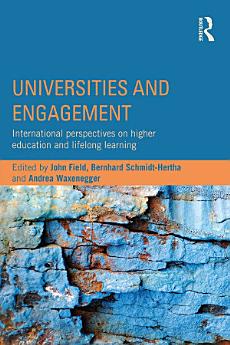Universities and Engagement: International perspectives on higher education and lifelong learning
អំពីសៀវភៅអេឡិចត្រូនិកនេះ
The book will offer an answer to the question ‘What can be understood by University Lifelong Learning today?’ by collating the work of specialists from across Europe and beyond who have first-hand experience in the field of university engagement through continuing education. With a diverse range of expertise from the UK, Ireland, Germany, Finland, Malta, Belgium, New Zealand, Austria and the USA, readers are guaranteed a varied and informative collection of perspectives on this important topic.
Taken as a whole, the book provides a theoretical background for readers, drawing on recent research and practice examples from a variety of countries and institutional settings, as well as demonstrating a variety of conceptual approaches, confirming the diverse range of possible solutions. Key topics covered include:
- research into policy and practice;
- engaging with business and industry;
- engaging with communities;
- engaging with an ageing society;
- active citizenship and regional competitiveness.
Developed in collaboration with the European University Continuing Education Network (EUCEN), Universities and Engagement is an invaluable contribution to research in the subject of lifelong learning. It will be of value to academics, practitioners and professionals with an interest in higher education and community management, and will be particularly suited to those interested in lifelong learning, adult education and community development.
អំពីអ្នកនិពន្ធ
John Field is an Emeritus Professor at the School of Education, University of Stirling, Scotland, working in research and graduate supervision, as well as teaching. He also serves as an Honorary Professor at the University of Warwick, and as chair of Scotland’s Learning Partnership.
Bernhard Schmidt-Hertha
is Full Professor for Educational Science with a focus on vocational continuing education and on-the-job training at the Eberhard Karls Universität Tübingen, Germany. He is Director of the Institute of Education, Member of the University Advisory Board for University Lifelong Learning and Convener of the European Network on Education and Learning of Older Adults (ELOA).Andrea Waxenegger
is the Director of the Center for Continuing Education at the University of Graz, Austria, working in policy development and development of best practice in university lifelong learning, learning in later life and intergenerational learning. She is the former President of EUCEN – European University Continuing Education Network.




